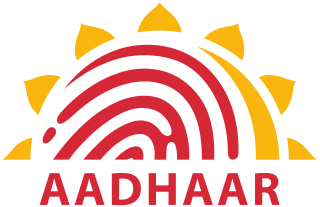Related Research Articles
Medicare is the publicly funded universal health care insurance scheme in Australia operated by the nation's social security agency, Services Australia. The scheme either partially or fully covers the cost of most health care, with services being delivered by state and territory governments or private enterprises. All Australian citizens and permanent residents are eligible to enrol in Medicare, as well as international visitors from 11 countries that have reciprocal agreements for medically necessary treatment.

A smart card (SC), chip card, or integrated circuit card, is a card used to control access to a resource. It is typically a plastic credit card-sized card with an embedded integrated circuit (IC) chip. Many smart cards include a pattern of metal contacts to electrically connect to the internal chip. Others are contactless, and some are both. Smart cards can provide personal identification, authentication, data storage, and application processing. Applications include identification, financial, public transit, computer security, schools, and healthcare. Smart cards may provide strong security authentication for single sign-on (SSO) within organizations. Numerous nations have deployed smart cards throughout their populations.

Identity theft, identity piracy or identity infringement occurs when someone uses another's personal identifying information, like their name, identifying number, or credit card number, without their permission, to commit fraud or other crimes. The term identity theft was coined in 1964. Since that time, the definition of identity theft has been legally defined throughout both the U.K. and the U.S. as the theft of personally identifiable information. Identity theft deliberately uses someone else's identity as a method to gain financial advantages or obtain credit and other benefits. The person whose identity has been stolen may suffer adverse consequences, especially if they are falsely held responsible for the perpetrator's actions. Personally identifiable information generally includes a person's name, date of birth, social security number, driver's license number, bank account or credit card numbers, PINs, electronic signatures, fingerprints, passwords, or any other information that can be used to access a person's financial resources.
An identity document is any document that may be used to prove a person's identity. If issued in a small, standard credit card size form, it is usually called an identity card, or passport card. Some countries issue formal identity documents, as national identification cards that may be compulsory or non-compulsory, while others may require identity verification using regional identification or informal documents. When the identity document incorporates a person's photograph, it may be called photo ID.

The Identity Cards Act 2006 was an Act of the Parliament of the United Kingdom that was repealed in 2011. It created National Identity Cards, a personal identification document and European Economic Area travel document, which were voluntarily issued to British citizens. It also created a resident registry database known as the National Identity Register (NIR), which has since been destroyed. In all around 15,000 National Identity Cards were issued until the act was repealed in 2011. The Identity Card for Foreign nationals was continued in the form of Biometric Residence Permits after 2011 under the provisions of the UK Borders Act 2007 and the Borders, Citizenship and Immigration Act 2009.

A Medicare card is a plastic card, the same size as a typical credit card, issued to Australian citizens and permanent residents and their families. The card or the Medicare number is required to be provided to enable the cardholder to receive a rebate of medical expenses under Australia's Medicare system, as well as subsidised medications under the Pharmaceutical Benefits Scheme (PBS). The card is usually green in colour, although interim cards are light blue and cards for Reciprocal Health Care Agreement visitors are light yellow. The cards are issued by a government agency called Services Australia.

Christopher Martin Ellison is an Australian lawyer and former politician. He served as a Senator for Western Australia from 1993 to 2009, representing the Liberal Party. He held ministerial office in the Howard government as Minister for Customs and Consumer Affairs (1997), Schools, Vocational Education and Training (1997–1998), Special Minister of State (1998–2001), Justice and Customs (2001–2007), and Human Services (2007).

An electronic identification ("eID") is a digital solution for proof of identity of citizens or organizations. They can be used to view to access benefits or services provided by government authorities, banks or other companies, for mobile payments, etc. Apart from online authentication and login, many electronic identity services also give users the option to sign electronic documents with a digital signature.

The Real ID Act of 2005 is an Act of Congress that establishes requirements that driver licenses and identification cards issued by U.S. states and territories must satisfy to be accepted for accessing federal government facilities and nuclear power plants and for boarding airline flights in the United States. The requirements include verification of the personal information presented when applying for the identification document, security features on the document, and electronic sharing of databases between states. The act also made various modifications to U.S. immigration law regarding asylum, border security, deportation, and certain work visas.
An age verification system, also known as an age gate, is any technical system that externally verifies a person's age. These systems are used primarily to restrict access to content classified, either voluntarily or by local laws, as being inappropriate for users under a specific age, such as alcohol, tobacco, gambling, video games with objectionable content, pornography, or to remain in compliance with online privacy laws that regulate the collection of personal information from minors, such as COPPA in the United States.
The Australia Card was a proposal for a national identification card for Australian citizens and resident foreigners. The proposal was made in 1985, and abandoned in 1987.
A contactless smart card is a contactless credential whose dimensions are credit card size. Its embedded integrated circuits can store data and communicate with a terminal via NFC. Commonplace uses include transit tickets, bank cards and passports.
The United Kingdom last had compulsory national identity cards during World War II when they were introduced for security purposes. Wartime ID cards were finally withdrawn by the Churchill government in 1952 because of the tension they created between the police and innocent citizens. Proposals to reintroduce them have been raised on a number of occasions since then. During the early 2000s and 2010s, organisations such as NO2ID campaigned against these proposals.
The go card is an electronic smartcard ticketing system developed by Cubic Corporation, which is currently used on the Translink public transport network in South East Queensland, Australia. To use the go card, users hold the card less than 10 cm away from the reader to "touch on" before starting a journey, and must do the same to "touch off" the service at the end of the journey. The cost of each journey is deducted from the go card balance.

Aadhaar is a 12-digit unique identity number that can be obtained voluntarily by all residents of India, based on their biometrics and demographic data. The data is collected by the Unique Identification Authority of India (UIDAI), a statutory authority established in January 2009 by the Government of India, under the jurisdiction of the Ministry of Electronics and Information Technology, following the provisions of the Aadhaar Act, 2016.
Biometrics refers to the automated recognition of individuals based on their biological and behavioral characteristics, not to be confused with statistical biometrics; which is used to analyse data in the biological sciences. Biometrics for the purposes of identification may involve DNA matching, facial recognition, fingerprints, retina and iris scanning, voice analysis, handwriting, gait, and even body odor.

A campus credential, more commonly known as a campus card or a campus ID card is an identification document certifying the status of students, faculty, staff or other constituents as members of the institutional community and eligible for access to services and resources. Campus credentials are typically valid for the duration of a student's enrollment or an employee's service.
Mass surveillance in Australia takes place in several network media, including telephone, internet, and other communications networks, financial systems, vehicle and transit networks, international travel, utilities, and government schemes and services including those asking citizens to report on themselves or other citizens.
JAM trinity refers to the government of India initiative to link Jan Dhan accounts, mobile numbers and Aadhaar cards of Indians to plug the leakages of government subsidies.

COVIDSafe was a digital contact tracing app released by the Australian Government on 26 April 2020 to help combat the ongoing COVID-19 pandemic. The app was intended to augment traditional contact tracing by automatically tracking encounters between users and later allowing a state or territory health authority to warn a user they have come within 1.5 metres with an infected person for 15 minutes or more. To achieve this, it used the BlueTrace and Herald protocol, originally developed by the Singaporean Government and VMWare respectively, to passively collect an anonymised registry of near contacts. The efficacy of the app was questioned over its lifetime, ultimately identifying just 2 confirmed cases by the time it was decommissioned on 16 August 2022.
References
- ↑ "What is the Access Card?". Government of Australia. Archived from the original on 4 March 2007. Retrieved 9 March 2007.
- ↑ "Press release announcing Senate Inquiry" (PDF). Australian Senate. Archived from the original (PDF) on 15 July 2007. Retrieved 15 March 2007.
- ↑ "Home Page of SFPAC". Australian Senate. Archived from the original on 2 February 2007. Retrieved 15 March 2007.
- ↑ "Report on Access Card Bill". Australian Senate. Archived from the original on 22 May 2007. Retrieved 15 March 2007.
- ↑ "Smart Card legislation on hold". The Australian. 15 March 2007. Archived from the original on 26 March 2007. Retrieved 16 March 2007.
- ↑ "Access Card Bill – hit for six". Access Card No Way Campaign. Retrieved 16 March 2007.
- ↑ Greanleaf, Graham (2007). "Still Quacking Like a Duck". Computer Law & Security Report. 23. SSRN 951358.
- ↑ "Card could have prevented Rau case". News.com.au. 16 February 2007. Archived from the original on 26 May 2007. Retrieved 9 March 2007.
- ↑ Stafford, Annabel (7 March 2007). "Security agencies could access health card data". Melbourne: The Age . Retrieved 9 March 2007.
- ↑ "Consumer & Privacy Taskforce". Australian Government. Archived from the original on 20 February 2007. Retrieved 9 March 2007.
- ↑ "Consultation on the Australian Government Health and Social Services Access Card – Discussion Paper Number 1". Australian Government, Office of the Privacy Commissioner. Retrieved 5 April 2013.
- ↑ "Report Number One" (PDF). Consumer and Privacy Taskforce. Archived from the original (PDF) on 25 February 2007. Retrieved 9 March 2007.
- ↑ "Australian Government response" (PDF). Australian Government. Archived from the original (PDF) on 25 February 2007. Retrieved 9 March 2007.
- ↑ Mckenzie, Scott (23 January 2007). "Cabinet reshuffle: Access Card project gets new head". ZDNet Australia. Retrieved 9 March 2007.
- ↑ Foo, Fran (4 March 2007). "Access Card chief falls on sword". ZDNet Australia. Retrieved 9 March 2007.
- ↑ Dearne, Karen (6 March 2007). "Ellison gets smartcard keys". The Australian . Retrieved 16 March 2007.[ dead link ]
- ↑ Dearne, Karen (30 January 2007). "Clock ticking for access card". The Australian. Archived from the original on 18 February 2016. Retrieved 11 December 2012.
- ↑ Deare, Steven (5 January 2007). "Government seeks access card integrator". ZDNet Australia. Retrieved 9 March 2007.
- ↑ Woodhead, Ben (31 January 2007). "Federal smartcard open for business". The Australian. Archived from the original on 2 February 2007. Retrieved 9 March 2007.
- ↑ "Canberra to cancel Access Card". The Australian. 27 November 2007. Archived from the original on 30 November 2007. Retrieved 27 November 2007.
- ↑ "Labor to dump Access Card". The Australian. 16 October 2007. Archived from the original on 16 November 2007. Retrieved 27 November 2007.